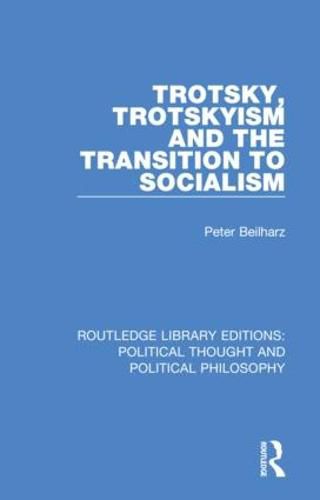Readings Newsletter
Become a Readings Member to make your shopping experience even easier.
Sign in or sign up for free!
You’re not far away from qualifying for FREE standard shipping within Australia
You’ve qualified for FREE standard shipping within Australia
The cart is loading…






First published in 1987. Trotskyists have long dominated the revolutionary tradition on the Western left. Written from a critical socialist standpoint, this book provides an analysis of Trotskyism and argues that Trotskyism is increasingly irrelevant as a means of achieving socialism. It argues that, as the realisation grows that the revolutionary tradition and the authoritarianism which necessarily result from it are wrong, the importance of the problem of the transition to socialism increases. It argues that on this point Trotskyism is weak; that Trotskyism’s proposals for socialist transition are largely rhetorical; and that its democratic impulse is weak. It supports this argument by showing that Trotsky’s philosophy of history, implicit in his writings, which the author characterises as evolutionary and necessitarian, coupled with a failure to grasp the moral basis of the socialist case, has a disabling effect on Trotsky’s account of the transition to socialism and on his explanation of Stalinism. Moreover, it argues that Trotsky’s intellectual and political heirs have been unable to escape from the contradictions inherent in his thought.
$9.00 standard shipping within Australia
FREE standard shipping within Australia for orders over $100.00
Express & International shipping calculated at checkout
First published in 1987. Trotskyists have long dominated the revolutionary tradition on the Western left. Written from a critical socialist standpoint, this book provides an analysis of Trotskyism and argues that Trotskyism is increasingly irrelevant as a means of achieving socialism. It argues that, as the realisation grows that the revolutionary tradition and the authoritarianism which necessarily result from it are wrong, the importance of the problem of the transition to socialism increases. It argues that on this point Trotskyism is weak; that Trotskyism’s proposals for socialist transition are largely rhetorical; and that its democratic impulse is weak. It supports this argument by showing that Trotsky’s philosophy of history, implicit in his writings, which the author characterises as evolutionary and necessitarian, coupled with a failure to grasp the moral basis of the socialist case, has a disabling effect on Trotsky’s account of the transition to socialism and on his explanation of Stalinism. Moreover, it argues that Trotsky’s intellectual and political heirs have been unable to escape from the contradictions inherent in his thought.